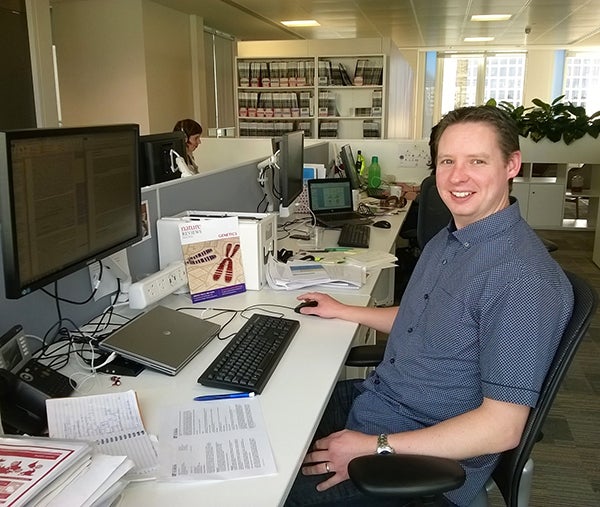As a high school student in England, Watson School of Biological Sciences alum Darren Burgess favored math and science to the arts and humanities. Likely, he said, this preference stemmed from his interest in how things work, a lack of worldly experience and the pathological academic weariness that seems to inflict almost every teenager. Worst of all, he added, were the essays.

Thus it was only natural that Darren studied the subjects he favored as a high school student in college and beyond.
“Throughout high school and my higher education, I envisioned that my career path would take me to an independent position in cancer research and—hopefully—to ultimately make a positive difference to the health of patients with cancer,” said Darren.
But then, around the time his post-doctoral stint in London was coming to a close, Darren’s career outlook began to change.
Darren was beginning to feel impatient with the often-slow pace of scientific research projects, nervous with the uncertainty of a long-term career as a research scientist, and the realization that even a lifetime of commitment to cancer research had only the small chance of improving the lives of cancer patients. He also worried that a life devoted to working in a lab might put too much strain on his broader personal and family life.
Darren considered careers in teaching and the pharmaceutical industry but realized they weren’t right for him. Finally, he found the ideal job, one that would allow him to stay in his beloved field of science yet would allow him more job stability and the opportunity to achieve a better work-life balance: an editor at a prestigious scientific journal.
“In hindsight,” said Darren, who now works as acting chief editor of Nature Reviews Genetics, based in London, “I find it amusing that it is partially this aversion to essays that led me down a career path that has eventually resulted in me assessing, editing and writing articles as my main day-to-day tasks.”
As acting chief editor at Nature Reviews Genetics, a monthly review journal covering the full spectrum of genetics topics, Darren is responsible for reviewing and editing researchers’ manuscripts from first draft to final copy. It’s also Darren’s duty to create ideas for the articles. Unlike most research journals, whose material is submitted by scientists eager to see their discoveries in print, the majority of the content in Nature Reviews Genetics is commissioned by its editorial staff.
Keeping up with the latest scientific discoveries is no small task. Each week, Darren and his colleagues leaf through several hundred newly published articles in the general areas of genetics and genomics. Also, according to Darren, in terms of keeping up with the latest research, attending scientific conferences is key.
“It’s not just the formal talks, but also informal conversations where people can be open about their opinions of excitement, controversies, challenges and future directions in their fields,” said Darren. “Many editors also tag on a visit to a research institute near the conference they are attending, as an additional source of information.”
One current genetics field of high interest—both to Darren and to the scientific community more generally—is genome editing using CRISPR. In March, Darren wrote a Research Highlight on CRISPR, detailing new possibilities in high-throughput functional genomics screens using technologies stemming from the original CRISPR-Cas9.
It’s a “powerful approach with great future opportunities,” said Darren, who commissioned an article on the topic from Dr. Feng Zheng at MIT, a central figure in the development of CRISPR-based technologies. In addition to CRISPR’s potential to transform research, Darren admitted he has a soft spot for such technologies that facilitate functional genomics, especially in organisms or cell types that have not been amenable to other methods of screening.
“Given that my own Ph.D. thesis research at CSHL was on analogous functional genomics screens,” said Darren, who used RNA interference screens to better understand chemotherapy resistance in cancer, “it was great to cover a field so close to my heart.”
Darren holds a Master of Biochemistry degree in molecular and cellular biochemistry from the University of Oxford; a Ph.D. in cancer genetics and cancer therapy from the WSBS at Cold Spring Harbor Laboratory; and three years of post-doctoral work studying cancer genetics at the Breakthrough Breast Cancer Research Center, Institute of Cancer Research, London. Given the amount of time and effort put into his studies, Darren admitted that it wasn’t easy to step out of the research lab and into a very different type of science career.
Yet serving as editor for a major scientific journal, said Darren, one who interacts with specialists from various scientific fields on a daily basis, is a rewarding—and influential—position.
“Although I am no longer actively involved in research,” said Darren, “I still get to make a contribution to global research directions by choosing which research fields I feel are the most deserving of high-profile coverage in our journal.”